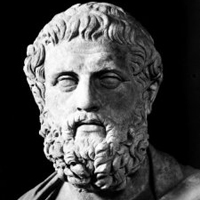The Reversal of Events in Oedipus Rex
The reversal of events happens towards the end of the play Oedipus Rex. But, before the actual and final reversal, where Oedipus talks to the old shepherd, there are many points where the bitter reality about the evil fate of Oedipus almost comes to light.

Sophocles
These 'almost' reversals, however, prepare by giving small turning points and adding to the information or doubt in the mind of Oedipus who investigates the reality relentlessly. So the issue of reversal should be discussed in terms of, all those minor turning points as well as the major and final reversal.
The element of 'reversal' is one of the features of the plot of a typical tragic play; the events of a tragedy must develop in such a way that everything leads the character to a tragic downfall. In the present tragedy also, the actions and decisions of Oedipus lead to a turning point where all his power and prestige, happiness and pride break like a balloon and he is seen helpless and pitiful. This turning of the situation makes the tragic character arrive at the inevitable (unavoidable) acceptance (or recognition) of the reality which he has been misunderstanding or underestimating.
In one sense, the first important turning point in the drama takes place in the very beginning: Oedipus is dragged personally into the crisis of the plague in Thebes, because he takes it with a lot of personal concern, and he indeed says that it is "for my own sake". His commitment towards the problem engages him personally and since his successful rule has been threatened, we feel when we look back that that was the turning point in his life. Then, after the charge of murder in the first scene by the blind seer Teiresias, the king enters vehemently into the investigation where he quickly encounters another turning point, the doubt about whether the man he had killed on the way was king Laius. Before Oedipus is able to go much ahead in the investigation, he again encounters the biggest of the minor turning points, the revelation of the truth that Polybos is not his father. With this, his investigation, and his life itself, take another turning point. The most happy and successful king now becomes emotionally disturbed and miserable. But, he still pushes himself ahead with the same confidence and arrogance. The final and catastrophic turning point comes when the shepherd arrives and tells the whole terrible truth.
When the shepherd tells that Oedipus is himself the sinful person who has married his own mother and killed his father, the great king suddenly becomes a tragic, miserable, and even an abominable character. This collapses all the vision and mission of the great king who was heretofore committed for avoiding evil and doing well, for finding the truth and helping the people, for living a happy and successful life with the help of his 'wisdom'.
Oedipus Rex Study Center
Greek Tragic Vision Reflected in Oedipus Rex
Tension between Individual and State in Oedipus Rex
Plot Construction in Oedipus Rex
Dramatic Technique in Oedipus Rex
Oedipus Rex as a Classical Tragedy
Exploration into Man's Nature in Oedipus Rex
Rationalist and Fatalist view in Oedipus Rex
 |
bachelorandmaster.com |